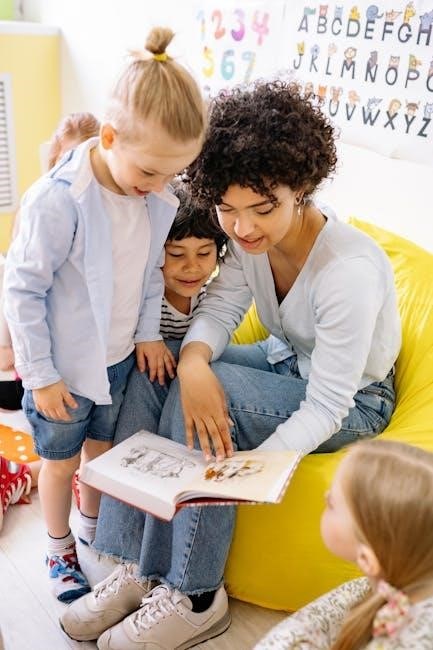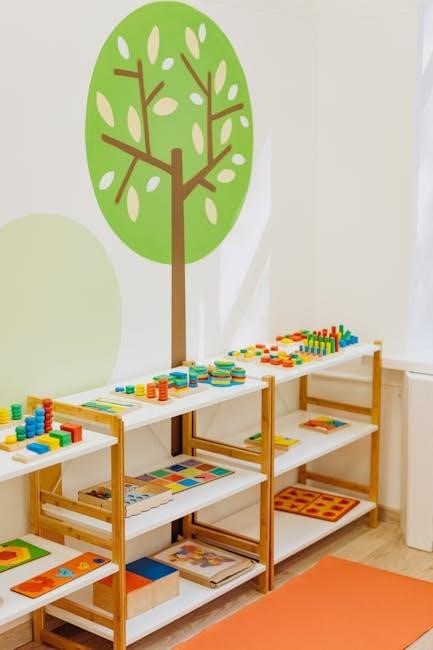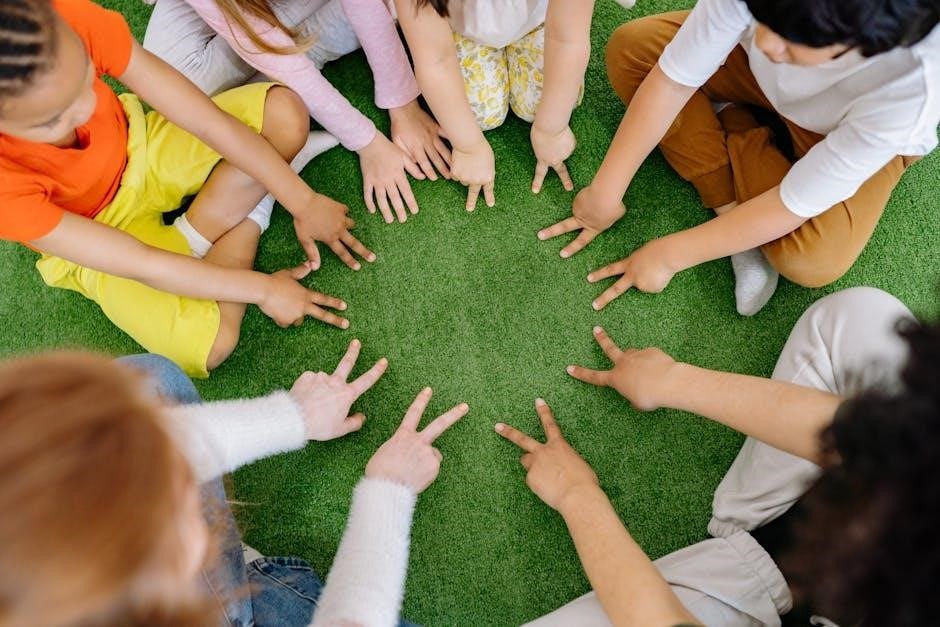The Kindergarten Readiness Checklist PDF is a comprehensive guide to help parents and educators assess a child’s preparedness for school, covering social, emotional, and academic skills effectively.
Purpose of the Checklist
The Kindergarten Readiness Checklist PDF is designed to help parents, caregivers, and educators assess a child’s readiness for kindergarten by identifying key skills in social, emotional, physical, and cognitive development.
Its purpose is to provide a clear framework for understanding what skills are essential for a successful transition to school, allowing families to support their child’s growth and prepare them for the academic and social challenges ahead. The checklist serves as a guide to celebrate progress and address areas that may need additional attention.
How to Use the Checklist Effectively
Start by reviewing the Kindergarten Readiness Checklist PDF with your child, checking off skills they have mastered and identifying areas for growth. Use the checklist to guide activities and conversations that support their development. Share the results with teachers or caregivers to create a collaborative approach to preparation. Regularly revisit the checklist to track progress and celebrate milestones. Remember, it’s a tool to support growth, not a test, so focus on fostering confidence and readiness.
Observe your child during daily activities to assess their skills accurately. Use the checklist to identify strengths and areas needing attention, then plan fun, engaging activities to help them improve. Encourage independence and provide opportunities for practice, such as drawing, puzzles, or interactions with peers. By using the checklist consistently, you’ll help your child feel prepared and excited for their kindergarten journey.

Social-Emotional Development Skills
Social-emotional skills are crucial for kindergarten success. These include expressing feelings appropriately, cooperating with others, and showing empathy. They help children interact confidently and adapt to new environments easily.
Self-Awareness and Self-Confidence
Self-awareness and self-confidence are key components of social-emotional development. A child should recognize their identity, express feelings appropriately, and demonstrate independence. They should know their name, age, and preferences, showing confidence in expressing their thoughts and needs. The ability to separate from parents and engage in group activities confidently is also important. These skills help children navigate social interactions and build a strong foundation for future emotional growth and academic success. Parents and educators can use the checklist to assess and support these developmental milestones effectively.
Cooperation and Friendship Skills
Cooperation and friendship skills are essential for a child’s success in kindergarten. These include taking turns, sharing materials, and resolving conflicts peacefully. The checklist assesses a child’s ability to cooperate with others, show empathy, and demonstrate kindness. It also evaluates their capacity to make friends, engage in group activities, and respect others’ feelings. Developing these skills helps children build positive relationships and work collaboratively, fostering a supportive and inclusive classroom environment. Parents and educators can use the checklist to encourage social growth and teamwork abilities effectively.
Emotional Regulation and Empathy
Emotional regulation and empathy are key components of social-emotional development. The checklist evaluates a child’s ability to recognize, express, and manage their emotions appropriately. It also assesses their capacity to understand and respond to others’ feelings, showing compassion and kindness. These skills are crucial for building positive relationships and navigating social situations. By fostering emotional awareness and empathy, parents and educators can help children develop self-control and a deeper understanding of others, creating a strong foundation for social success in kindergarten and beyond.
Language and Communication Skills
Language and communication skills are fundamental for kindergarten success. The checklist evaluates verbal communication, vocabulary, listening abilities, and understanding instructions, ensuring a strong foundation for literacy and learning.
Verbal Communication and Vocabulary
Verbal communication and vocabulary skills are essential for kindergarten readiness. The checklist assesses a child’s ability to speak in complete sentences, use appropriate volume, and express thoughts clearly. It also evaluates vocabulary size and understanding of basic instructions. Recognizing letters, identifying shapes, and sorting objects by name are included to gauge foundational literacy and cognitive abilities. These skills help children engage effectively in classroom activities and build a strong basis for future learning and social interactions. Mastering these areas ensures confidence in communication and academic participation.
Listening Skills and Understanding Instructions
Listening skills and understanding instructions are crucial for kindergarten success. The checklist evaluates a child’s ability to follow directions, comprehend stories, and identify sounds or rhymes. It assesses whether a child can listen attentively, remember sequences, and respond appropriately to verbal cues. These skills are vital for engaging in classroom activities, completing tasks, and building foundational learning abilities. Strong listening skills enhance a child’s capacity to learn, participate in group activities, and interact effectively with peers and teachers. They form the basis for successful communication and academic growth.
Basic Literacy Skills (Recognizing Letters and Words)
Basic literacy skills involve recognizing letters and simple words, foundational for reading and writing. The checklist assesses a child’s ability to identify uppercase and lowercase letters, understand letter-sound relationships, and recognize common sight words. It also evaluates whether a child can identify their name in print and demonstrate an awareness of print concepts, such as left-to-right and top-to-bottom text direction. These skills are essential for early reading development and prepare children for more complex literacy tasks in kindergarten.
Visual Motor Skills
Visual motor skills involve abilities like drawing shapes, building towers, and completing puzzles. These activities enhance coordination and precision, essential for kindergarten tasks.
Drawing and Coloring Abilities
Drawing and coloring are essential visual motor skills for kindergarten readiness. These activities improve hand-eye coordination and fine motor control. Children should be able to draw simple shapes like circles, squares, and triangles. They should also demonstrate the ability to color within boundaries and use tools like crayons or markers effectively. These skills not only enhance creativity but also prepare children for writing and other academic tasks. Encouraging regular practice helps build confidence and dexterity, laying a strong foundation for future learning.
Completing Puzzles and Matching Shapes
Completing puzzles and matching shapes are vital skills for kindergarten readiness, enhancing problem-solving abilities and hand-eye coordination. Children should be able to identify and match basic shapes, such as circles, squares, and triangles. Simple interlocking puzzles also help develop critical thinking and patience. These activities improve cognitive development and prepare children for math concepts like sorting and patterns. Regular practice with puzzles and shape-sorting toys builds confidence and foundational skills for future academic success.

Fine Motor Skills
Fine motor skills involve using hands to perform tasks like holding crayons, cutting with scissors, and buttoning shirts. Mastery of these skills is crucial for kindergarten readiness.
Using Scissors, Crayons, and Writing Tools
Using scissors, crayons, and writing tools is a key fine motor skill for kindergarten readiness. Children should demonstrate the ability to hold scissors correctly and cut straight lines or simple shapes. They should also show proficiency in coloring within boundaries and using crayons or markers with control. Additionally, children are expected to hold writing tools like pencils or crayons with a functional grasp, allowing them to draw shapes or write their name legibly. These skills enhance hand-eye coordination and dexterity, essential for academic tasks.
Writing Name and Simple Words
Writing their name and simple words is a foundational skill for kindergarten readiness. Children should be able to write their name legibly, recognizing uppercase and lowercase letters. They should also demonstrate the ability to write short, simple words, such as “mom” or “dad.” This skill showcases their understanding of letter formation and basic writing concepts. While some may still reverse letters, consistent practice can refine these abilities, preparing them for more complex writing tasks in the classroom environment.

Cognitive Development
Cognitive development involves skills like problem-solving and critical thinking, with children demonstrating an understanding of basic math concepts such as counting, shapes, and sorting. These abilities help children think logically and prepare for academic tasks, laying a strong foundation for future learning.
Problem-Solving and Critical Thinking
Problem-solving and critical thinking are essential skills for kindergarten readiness; These abilities help children approach challenges methodically, make logical decisions, and understand cause-and-effect relationships. A child should demonstrate the capacity to suggest simple solutions to conflicts, show curiosity, and engage in creative thinking. For example, they might solve puzzles or figure out how to share toys with peers. These skills lay the groundwork for academic success and independent learning, enabling children to navigate everyday situations confidently and imaginatively.
Basic Math Concepts (Counting, Shapes, Sorting)
Understanding basic math concepts, such as counting, recognizing shapes, and sorting objects, is a fundamental part of kindergarten readiness. A child should be able to count up to 20, identify basic shapes like circles, squares, and triangles, and sort objects by color, size, or shape. These skills build a strong foundation for future math learning and help children develop logical thinking. Practicing these concepts through play or daily activities can make learning engaging and fun, ensuring a smooth transition to formal education.
Physical Development
Physical development includes gross motor skills like running, jumping, and balancing, as well as fine motor skills such as buttoning, zipping, and using utensils effectively.
Gross Motor Skills (Running, Jumping, Balancing)
gross motor skills, such as running, jumping, and balancing, are vital for physical development. These skills help children navigate their environment with coordination and control. Running and jumping demonstrate strength and endurance, while balancing shows stability and overall physical confidence. These abilities are essential for playground activities, group games, and maintaining focus during classroom transitions. Assessing these skills helps determine a child’s readiness for active participation in kindergarten. Encouraging practice through play strengthens these abilities, ensuring children are prepared for school.
Fine Motor Skills (Buttoning, Zipping, Using Utensils)
Fine motor skills, such as buttoning, zipping, and using utensils, are crucial for daily tasks and independence. These skills require precision and hand-eye coordination, reflecting a child’s ability to manipulate small objects. Buttoning a shirt or zipping a jacket demonstrates dexterity, while using utensils like forks or spoons shows control and accuracy. These abilities are essential for self-care and participating in classroom activities. Assessing these skills helps identify readiness for tasks like writing or using tools, ensuring a smooth transition to kindergarten.
The Kindergarten Readiness Checklist PDF provides a clear roadmap for assessing and fostering essential skills, ensuring a smooth transition to school. Celebrate progress and embrace this exciting milestone confidently!
Next Steps After Completing the Checklist
After completing the Kindergarten Readiness Checklist PDF, identify areas where your child may need additional support. Create a plan with fun, engaging activities to strengthen those skills. Celebrate their progress and involve teachers or educators for personalized guidance. Regularly monitor improvements and adjust strategies as needed. This proactive approach ensures your child feels confident and prepared for their educational journey. Remember, every step forward is a celebration of growth and readiness for the exciting adventures ahead!